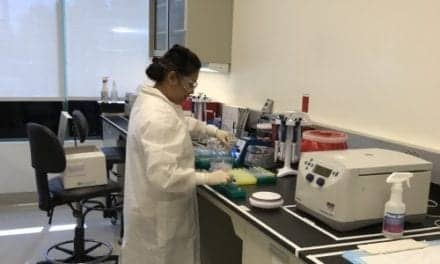Roche announced the U.S. Food and Drug Administration (FDA) has approved the VENTANA PD-L1 (SP263) Assay as a companion diagnostic to identify non-small cell lung cancer (NSCLC) patients eligible for treatment with Libtayo (cemiplimab), a PD-1 inhibitor therapy developed by Regeneron.
More than 60% of patients diagnosed with NSCLC are diagnosed at locally advanced or metastatic stage (Stage III-IV).2 With this launch, more patients may have access to an additional immunotherapy option with Libtayo, potentially improving their treatment pathway and outcomes, Roche says.
Further reading: The Evolution of the PD-L1 Testing Market
“Diagnostics, like our high medical value PD-L1 assay portfolio, enable personalized medicine to help improve patient outcomes,” says Jill German, head of pathology lab, Roche Diagnostics. “This approval helps physicians make more confident treatment decisions by identifying patients with tumors that may respond to the immunotherapy Libtayo.”
The VENTANA PD-L1 (SP263) Assay is an FDA approved product available with NSCLC indications for four different immunotherapy drugs, offering oncologists a broad range of treatment options for patients. Treating NSCLC as early as possible may improve patient outcomes.
Lung cancer is the leading cause of cancer death worldwide. Every year, more than 2.2 million people are diagnosed with lung cancer globally and up to 85% of these cases are NSCLC.3,4
The VENTANA PD-L1 (SP263) Assay
VENTANA PD-L1 (SP263) Assay is used to detect programmed death ligand-1 (PD-L1) protein in non-small cell lung carcinoma (NSCLC) patients. PD-L1 expression on tumor cells and immune cells has been shown in clinical studies to help predict the likelihood a patient may benefit from PD-L1/PD-1 immunotherapy drugs.5
VENTANA PD-L1 (SP263) Assay testing is performed on a BenchMark ULTRA instrument and is visualised using the OptiView DAB IHC Detection Kit.
Photo: PRNewsfoto/Roche
References
1. Regeneron news release. FDA approves LIBTAYO® (Cemiplimab-rwlc) monotherapy for patients with first-line advanced non-small cell lung cancer with PD-L1 expression of ≥50% with no EGFR, ALK, or ROS mutations as determined by an FDA-approved test. (Refer to product for full intended use)
2. EpiCast Report: NSCLC Epidemiology Forecast to 2025. GlobalData. 2016
3. World Health Organization: GLOBOCAN 2020 – Lung Cancer: Estimated cancer incidence, mortality and prevalence worldwide. [Internet; cited May 2021] Available from: https://gco.iarc.fr/today/data/factsheets/cancers/15-Lung-fact-sheet.pdf.
4. Cancer.org: What is non-small-cell lung cancer? [Internet; cited May 2021] Available from: https://www.cancer.org/cancer/lung-cancer/about/what-is.html#:





